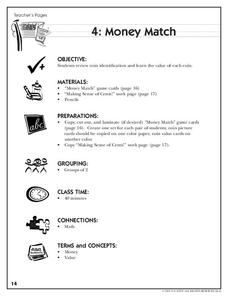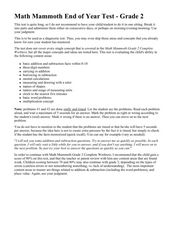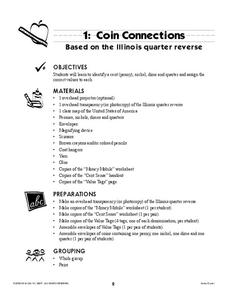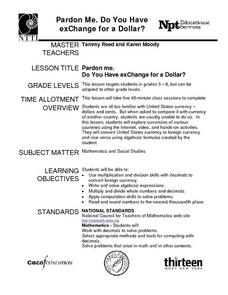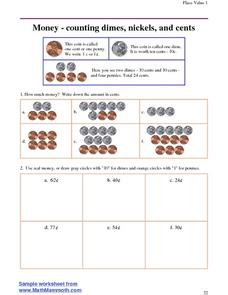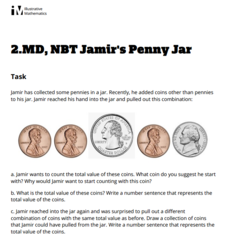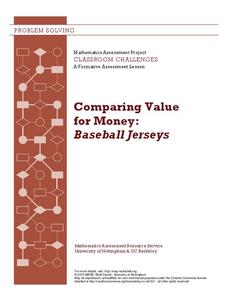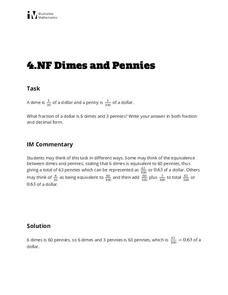Curated OER
Show Me The Money
Third graders explore the value of U.S. money. In this money activity, 3rd graders print out pictures of money from the Internet and create play money. The students will play a game in which they display the amount of money called out by...
Curated OER
Money - Mixed Practice
In this counting coins worksheet, students examine the 6 sets of coins pictured and record the value of each of the sets shown.
Curated OER
Money Matters - Introduction to the Penny
This nicely-designed PowerPoint is meant to teach young students about the penny, and how much pennies are worth. After a warm-up component, students engage in some guided practice problems where they must represent values by using...
Curated OER
Value of Coins
What a quick and easy way to practice the names of and values of coins! This short activity has a picture of a coin, such as a nickel, and a space to have students write down its name and its value. While not a comprehensive review, this...
Curated OER
Money Match
Playing a game can be educational, pupils use this matching activity to identify coins and their values. This is a great way to have learners practice their money sense.
Curated OER
Place Value of Decimals to Hundredths: Diving for Decimals
Constructing decimals correctly is a crucial concept for elementary students to grasp. Here, have the young mathematicians in your class explore standard and expanded form while comparing decimal values. This unit is taught while...
Curated OER
Number Value Assessment
Quiz your second graders with this set of math worksheets involving place value, word problems, number sequence, greater than/less than, coin value, expanded form, and much more! Most have multiple choice answers provided, and generally...
Curated OER
Stamping Coins
Learners demonstrate that they can use a variety of coin combinations to make a single amount. They study all the ways to make 50 cents using coins using different coins.
Curated OER
Math Games for Skills and Concepts
A 27-page packet full of math games and activities builds on algebra, measurement, geometry, fractional, and graphing skills. Young mathematicians participate in math games collaboratively, promoting teamwork and skills practice.
Curated OER
Math Mammoth End of Year Test - Grade 2
Assess your second graders with this end of the year test. Originally meant for home school, this assessment could also be used in a larger setting. Learners complete 35 problems based on their knowledge of the second grade math...
EngageNY
Using Expected Values to Compare Strategies
Discover how mathematics can be useful in comparing strategies. Scholars develop probability distributions for situations and calculate expected value. They use their results to identify the best strategy for the situation.
Curated OER
The Value of Education
Money is always a great motivator. Give the class a set of statistics regarding yearly annual wages with the corresponding level of completed education. Even if they think college is silly, they'll consider it when they realize how much...
Curated OER
Comparing Values: Comparisons Between Musical Notation and Money
Students identify ways in which the principles and subject matter of other disciplines taught in school, specifically math, are interrelated with those of music.
Curated OER
Alexander Used to Be Rich
Reading Alexander, Who Used to Be Rich Last Sunday, launches this instructional activity appropriate for children who recognize coins and have been introduced to coin values. Using addition and subtraction skills, the class tracks...
Curated OER
Coin Connections
A wonderful instructional activity on identifying the penny, nickel, dime, and quarter awaits your young mathematicians. They engage in a multi-session instructional activity which allows them to practice using the values of each coin in...
Curated OER
Pardon Me. Do You Have Change For a Dollar?
Upper elementary and middle school learners explore currencies from a variety of countries. They use the Internet, video, and engage in hands-on activities. They practice converting U.S. currency to foreign currency and vice versa. This...
Curated OER
Money - counting dimes, nickels, and cents
In this counting dimes, nickels, and pennies learning exercise, students review pictures of coins with their values, count money and write the total amounts, and use real money to show given amounts of change. Students write twelve answers.
Illustrative Mathematics
Jamir's Penny Jar
Before you start counting the coins in Jamir's coin jar, figure out which coin to start with. Should it be the penny or the quarter? Why? This is the focus around a worksheet that works well as an assessment on counting money and...
TESCCC
Place Value to 999,999
Master place value with a series of lessons that use math journals, manipulatives, and place value mats. Kids follow the instructions to represent numbers of all sizes with base ten blocks and recording sheets.
Curated OER
Comparing Value for Money: Baseball Jerseys
Learners step up to the plate as they first complete an assessment task using linear equations to determine the best company from which to buy baseball jerseys. They then evaluate provided sample responses identifying strengths and...
101 Questions
Money Duck
A video presentation shows duck-shaped soap that has a $1, $5, $10, $20, or $50 bill in its center. Learners consider different population distribution of the bills to determine a reasonable price for the duck.
Illustrative Mathematics
Dimes and Pennies
Help your fourth graders make cents out of fractions and decimals with this short word problem. After learning that dimes are one-tenth and pennies one-hundredth of a dollar, students write a fraction and decimal for a given number...
Curriculum Corner
Academic Math Vocabulary
The ABCs of math are so important. Find commonly used math terms in a 42-page packet. Each page has the word, a place to write the definition, and a place to give specific examples of the term. A must-have for all math classrooms!
Curated OER
Summer Packet - Math & Reading
In this math and reading comprehension worksheet packet, students solve 700 basic addition, subtraction, multiplication, and division facts. Next, they identify what a sentence looks like, the difference between there and their, and read...






